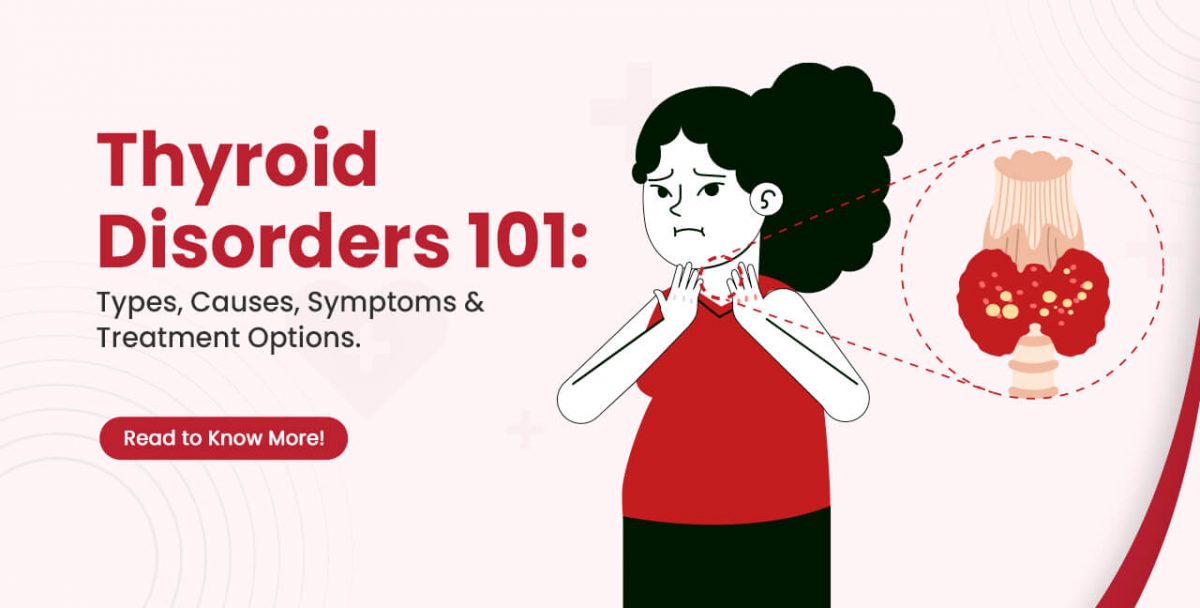
The thyroid gland is a tiny butterfly-shaped gland near the base of the neck, directly below Adam’s apple. The thyroid gland produces two primary hormones known as thyroxine (T-4) and triiodothyronine (T-3). These hormones have an impact on every cell in the body. It helps the body’s utilization of fats, and carbohydrates and also the regulation of body temperature. They influence the heart rate and help to regulate how much protein the body produces.
When your thyroid gland fails to function properly, it can affect your entire body. If your body produces too much thyroid hormone, it can develop hyperthyroidism. If your body produces insufficient thyroid hormone leads to the condition called hypothyroidism. Both conditions are serious and must be treated by your healthcare provider.
Types of Thyroid Disorders
There are two main types of thyroid conditions namely hypothyroidism and hyperthyroidism. Other disorders also affect the thyroid gland’s function and can induce both problems.
Hypothyroidism is caused by the following conditions:
Thyroiditis: It is an inflammation of the thyroid gland. Thyroiditis reduces the amount of hormones produced by your thyroid.
Hashimoto’s thyroiditis: Hashimoto’s thyroiditis is a painless autoimmune illness in which the cells of the body fight and damage the thyroid. This is a hereditary disorder.
Postpartum thyroiditis: It commonly affects 5% to 9% of women after giving delivery. It is a temporary condition.
Iodine deficiency: The thyroid uses iodine to generate hormones. Iodine insufficiency is a worldwide issue that affects millions of people.
Thyroid gland dysfunction: From birth, the thyroid gland does not always work properly. This affects around one in every 4,000 newborns. If the child is not treated, he or she may develop physical and mental issues later in life. All babies are given a screening blood test in the hospital to check their thyroid function.
Hyperthyroidism is caused by the following conditions:
Grave’s disease: The thyroid gland as an entire may become overactive and produce an excessive amount of hormone in this condition. Diffuse toxic goitre (enlarged thyroid gland) is another name for this type of condition.
Nodules: Hyperthyroidism is induced by hyperactive thyroid nodules. A toxic autonomously functioning thyroid nodule is a single nodule, whereas a toxic multinodular goiter is a gland that contains several nodules.
Thyroiditis: This condition might be uncomfortable or not at all. Thyroiditis causes the thyroid to release hormones that have been stored there. This condition can continue for several weeks or months.
The Common Thyroid Symptoms
Some of the common thyroid symptoms include:
- Hyperthyroidism
- Experiencing anxiety, impatience, and nervousness
- Losing weight
- Having an enlarged thyroid gland, often known as a goiter.
- Feeling tremors and physical weakness.
- Having irregular menstrual periods or having your menstrual cycle stops
- Experiencing visual issues or eye irritation.
- Hypothyroidism
- Tiredness (fatigue).
- Gaining weight.
- Having heavy and frequent menstrual cycles.
- Developing coarse, dry hair.
- Having a hoarse voice.
- Experiencing an intolerance to cold temperatures.
Thyroid Disorders Diagnosis and tests
Blood tests: Blood tests that detect the hormones T-4 and T-3, as well as thyroid-stimulating hormone (TSH), can confirm a hyperthyroidism diagnosis. Hyperthyroidism is characterized by a high T-4 level and a low TSH level.
If the blood test result shows Hyperthyroidism, then you have to follow the tests such as
Radioiodine scan and uptake test: For this test, you ingest a small dosage of radioactive iodine, known as radioiodine, to see how much of it accumulates in your thyroid gland and where it accumulates.
Thyroid ultrasound: This test uses high-frequency sound waves to make images in this test. Ultrasound may be more effective than other testing in detecting thyroid nodules. Because there is no radiation exposure with this test, it can be utilized for pregnant or breastfeeding women, as well as those who cannot take radioiodine.
The greatest thing you can do if you are suffering any of the symptoms of hypothyroidism is to check with your doctor. If discovered and treated early, hypothyroidism is very curable.
Understanding thyroid health is vital for overall health. Taking a proactive approach that includes regular check-ups, a balanced lifestyle, and nutrient-rich food can support their thyroid function and reduce their risk of thyroid diseases. Taking control of your thyroid health is a powerful step towards living a more vibrant and active life.

 Call-an-Ambulance
Call-an-Ambulance



